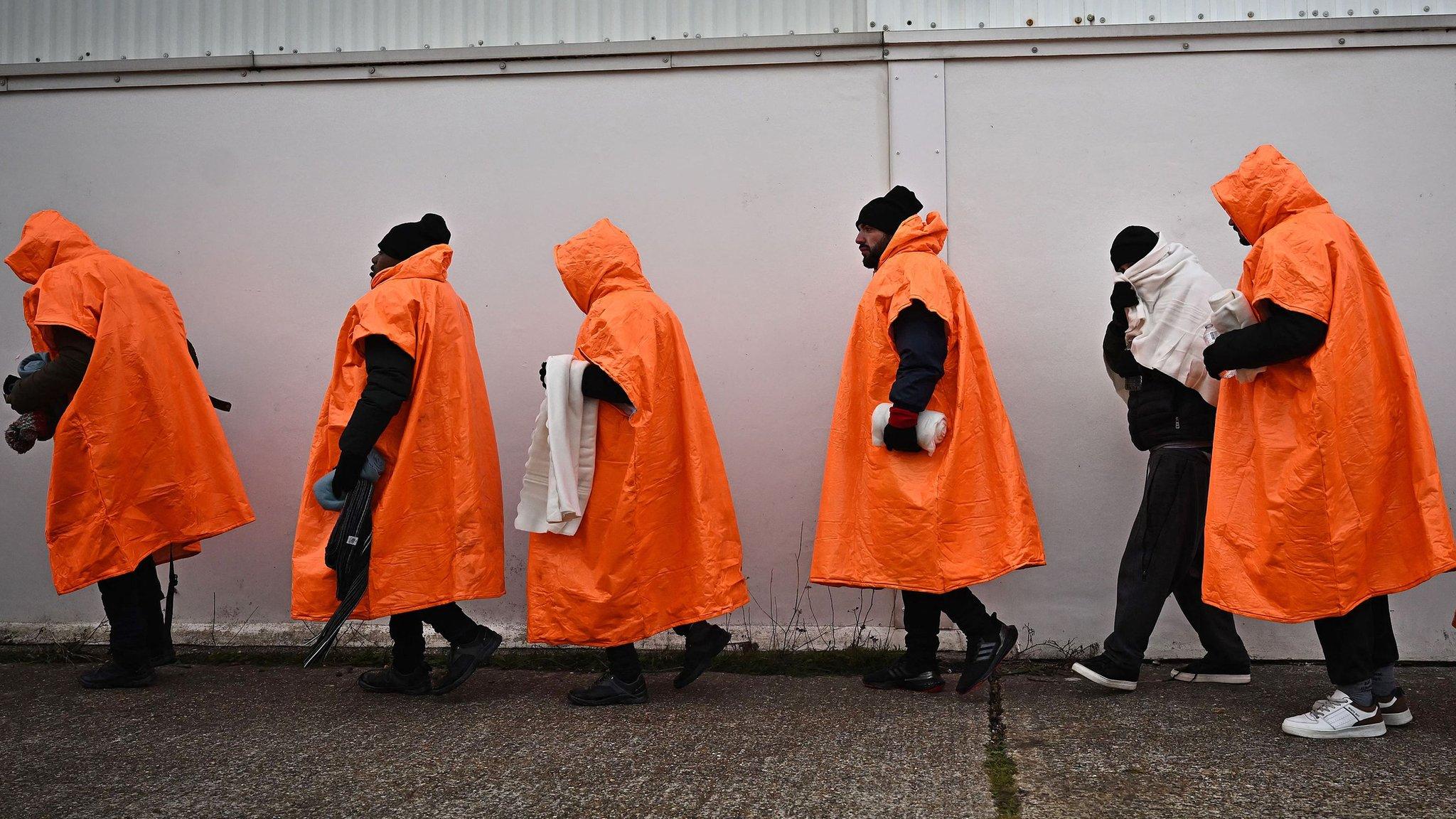Borders Bill: Post-Brexit overhaul of asylum rules unveiled
- Published

More than 2,000 migrants have crossed the Channel on small boats in June
Knowingly arriving in the UK without permission will become a new criminal offence, under legislation unveiled by ministers.
The Nationality and Borders Bill will also introduce longer maximum sentences for those entering the UK without a legal reason.
The government hopes the overhaul of asylum rules will deter migrants crossing the English Channel.
But Labour said the blueprint would potentially break international law.
The long-anticipated legislation, published on Tuesday, external, will now face detailed scrutiny from MPs and peers later this year.
It has prompted a backlash from campaigners and refugee charities, with one branding it "extreme and nasty".
Home Secretary Priti Patel promised the bill would create a "firm but fair" asylum system to allow the UK to "take full control of its borders".
Describing the current rules as "broken," she promised the bill would "break the business model" of people-smuggling gangs.
A record 6,000 people crossed the English Channel in small boats in the first six months of 2021, meaning last year's figure of 8,417 could soon be eclipsed over the summer.
The 87-page bill includes measures to introduce:
a maximum life sentence for those convicted of people smuggling
new age assessments to identify adult migrants pretending to be children
a downgraded status for those asylum seekers the government fails to deport to a safe country
new powers for Border Force to stop and divert vessels suspected of carrying illegal migrants

Small boat crossings over the Channel typically increase over the summer
The bill also contains powers to allow asylum claims to be processed outside the UK, potentially paving the way for applications to be processed in controversial offshore centres.
However, making such centres a reality would require the UK to first negotiate processing agreements with other countries.
The idea has already prompted a backlash from campaign groups and charities, and would likely face legal challenges on rights grounds.
After Brexit the UK left the EU's Dublin scheme, under which it could transfer asylum seekers who crossed Europe to EU states to have their applications processed there.
The government had criticised the effectiveness of this scheme and vowed to negotiate replacement agreements - but none have been established so far.
More than 36,000 people, including dependents, applied for asylum in the UK in 2020.
At the end of the year, there was a backlog of 109,000 cases being processed, with over 79,000 in the system for over a year.


The migrant dinghies being towed into the Tug Haven facility in Dover almost every day represent a humiliating challenge to the home secretary and her commitment to control the country's borders.
Without reciprocal agreements in place after Brexit, Priti Patel has been unable to deport a single one of the migrants her department has deemed "inadmissible".
Her appointment last summer of a Clandestine Channel Threat Commander to stop crossings has been followed, this summer, by record numbers of migrants arriving on the Kent coast.
There is political frustration at the apparent impotence of the Home Office to deal with people smugglers.
But the powers in this bill require the agreement of other countries to make them work - and while negotiations continue behind the scenes, few deals have yet been struck.
It is, perhaps, the paradox of Brexit that taking control of your borders requires more international co-operation, not less.

Labour's shadow home secretary Nick Thomas-Symonds said the measures in the bill would not deal with the "chaos" created by the Conservatives since 2010.
"They don't deal with the fact that the time taken to process claims has rocketed or desperate people are still falling victim to criminal gangs," he said.
He added that the proposals would also "reduce support" for victims of human trafficking, and "potentially break international law".
'Anti-refugee bill'
The Law Society of England and Wales warned the plans were likely to breach UK obligations under the 1951 UN Refugee Convention, the cornerstone of international asylum law.
Tim Naor Hilton, chief executive of Refugee Action, said the bill was a "crackdown on traumatised people whose only wish is to build a new life here".
"This extreme and nasty anti-refugee bill has no place in any country that seeks to defend human rights and the rule of law," he added.
The Home Office denied that the bill breaks international law, and said it complied with the UK's international obligations, including under the Refugee Convention.
Related topics
- Published13 December 2023
